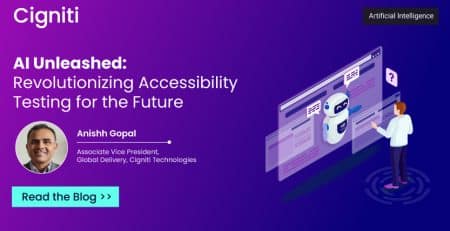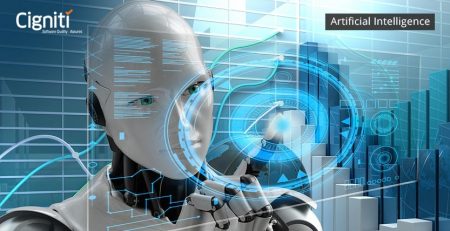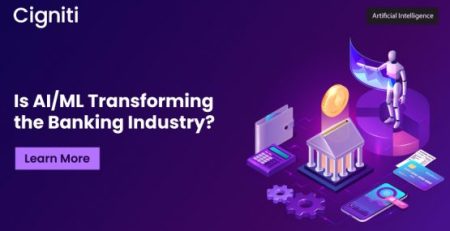Making AI-based Testing platforms relevant for super-busy user applications. What’s the value?
|
Listen on the go!
|
An article in Forbes by Bernard Marr, an internationally best-selling author mentions, ‘The integration of artificial intelligence and the financial industry has always been a match made in heaven—high volumes, the quantitative aspect of finances, need for expediency and accuracy are ideal for the unique skill-set of AI.’ These and many such related benefits of AI, makes its adoption indispensable across diverse industries and domains. Within the Software Testing domain, AI-based testing platforms are being adopted for ensuring accuracy, bringing speed, and enhancing the performance of the QA process. How can we estimate its benefits as far as high-speed and super speed applications are concerned?
The article on integrating AI and the financial industry goes on to speak about the inherent intellect of AI platforms, ‘Artificially intelligent machines analyze inordinate amounts of data at extraordinary speeds that is impossible for humans. They learn from the information they analyze to improve their trading acumen. This information includes market prices to corporate financial reports and accounting documents to social media, news trends, and macroeconomic data. Once the information is analyzed by thousands of machines, the machines then “vote” on what action to take and the best trades to make.’’
Self-learning capabilities, in-built intellect, predictive capabilities, analytical decision-making, and downright accuracy are some compelling reasons for considering AI-driven software testing platforms. That being said, a lot still remains to be explored in this sphere of testing methodologies. Knowing the challenges that application development involves, AI can definitely bring a lot of value for applications that need constant data support and intense predictive capabilities.
What are these super-busy applications?
Any industry that needs constant engagement with the end customers, needs data analysis, predictive strengths to deliver an immediate forecast, and many such smart capabilities are required to build an intelligent application. Some of the prominent examples from the industry are Trading applications, gaming applications, and sports applications. These applications need to be tested not just for their functional and performance efficiency, but also for their predictive and analytical capabilities.
A recent report on best Cryptocurrency Trading applications mentions some key areas that the application must cover, ‘While choosing a platform for trading, it is always important to consider the availability of a mobile version, as it will allow you to get rid of an asset or, on the contrary, buy it at once. The functionality of mobile apps, as a rule, is not too different from the web version. The cryptocurrency trading program is also provided with a quotation schedule, the ability to deposit/withdraw funds from the balance, make an order to buy or sell. In order to start trading cryptocurrency from your device, usually it is only needed to download an app from the App Store or Google Play, install it on your smartphone, and then log in to your account. It is also worth mentioning the two-factor authentication system, which is likely to be required to verify identity.’
Digital Assurance and Testing with a mix of smart automation is needed to enhance and keep upgrading the quality of the application. How can AI as an automation and testing platform further augment the Quality Assurance efforts?
What can AI-driven testing platforms do for highly-engaging applications?
Author Bernard Marr in another article talks further about application of AI. He mentions, ‘Research into applied, specialised AI is already providing breakthroughs in fields of study from quantum physics where it is used to model and predict the behaviour of systems comprised of billions of subatomic particles, to medicine where it being used to diagnose patients based on genomic data.’
Reference to the industry ‘it (AI) is employed in the financial world for uses ranging from fraud detection to improving customer service by predicting what services customers will need. In manufacturing it is used to manage workforces and production processes as well as for predicting faults before they occur, therefore enabling predictive maintenance. In the consumer world more and more of the technology we are adopting into our everyday lives is becoming powered by AI – from smartphone assistants like Apple’s Siri and Google’s Google Assistant, to self-driving and autonomous cars which many are predicting will outnumber manually driven cars within our lifetimes.’
These are some of the key reasons why AI has been adopted even in the application testing cycle. It is business critical for testers to ensure that the application delivers the expected functionality, performance, and secure interface to the users. This requires adoption of flawless automation platforms to not just bring velocity, but also precision within the testing cycle.
Whether it be the health, finance, or entertainment sector – every industry is trying to innovate and use AI-based apps that help automate tasks. This makes testing the apps for automation a business-critical activity. However, there are multiple testing related challenges that organizations may face while leveraging AI for testing apps for quality, such as:
- Identifying the exact use cases
- Lack of awareness as to what really needs to be done
- Verifying the behavior of the apps based on the data that has been input
- Testing the app for functionality, performance, scalability, stability, security, and much more for it to be successful
Quality Governance is absolutely critical while testing any kind of application, which makes daily deployments and DevOps transformation important. When DevOps comes into play, it becomes imperative to adopt effective automation platforms to accelerate the QA cycle and improvise the test management efforts as well.
As stated in a recent article, ‘With the introduction of AI and ML, software testing will become even better. AI with the help of ML can write its own line of code by stealing from existing software. It can also be used for test execution and maintenance.Test automation and regression testing will only be smarter, faster and better with the introduction of AI. The testers can stop worrying about the usual boring tasks and start concentrating on better strategies.’





Leave a Reply